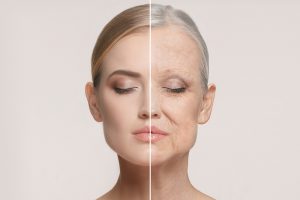Depression is one of the most common mental illnesses in old age, with one in three people over the age of 65 being affected. Depression can cause many distressing symptoms that severely limit your quality of life. According to current research published in Nature Mental Health, older adults with depression are said to age even faster than their peers. They also have poor cardiovascular and cognitive health.
How Depression Accelerates the Aging Process
Breno Diniz, a geriatric psychiatrist at the UConn School of Medicine and author of the study, along with colleagues from several other institutions, studied 426 people with late-stage depression. The scientists measured the protein levels in each person’s blood associated with aging. As a cell ages, it begins to function differently and less efficiently than a “young” cell. It often produces proteins that promote inflammation or other unhealthy conditions, and these proteins can be measured in the blood. Researchers compared levels of these proteins to measures of physical health, medical problems, brain function, and the severity of their depression. To their surprise, the severity of a person’s depression seemed unrelated to their degree of accelerated aging. However, they found that accelerated aging was associated with poorer cardiovascular health overall. People with higher levels of age-associated proteins were more likely to have high blood pressure, high cholesterol, and other health problems. Accelerated aging was also associated with poorer performance on brain health tests such as working memory and other cognitive skills.
Researchers are now studying whether therapies to reduce the number of aged, ‘senescent’ cells in a person’s body can improve depression later in life. They are also studying specific sources and patterns of proteins associated with aging to see if this could lead to personalized treatments in the future.
Women Who Enter Menopause Later in Life have a Lower Risk of Depression
Is there a link between your menopause age and later depression? A review of the medical literature suggests that older menopausal age was associated with a lower risk of depression in women later in life. The study results suggest that menopause at age 40 or older is associated with a reduced risk of depression compared to early menopause. Older age and longer reproductive periods mean longer exposure to endogenous estrogens. This meta-analysis suggests a potentially protective effect of increasing duration of exposure to endogenous estrogens, as measured by age at menopause and length of reproductive period.
Certain Brain Protein is Associated With Perimenopausal Depression
Research shows that women approaching menopause have higher levels of a brain protein linked to depression than younger and menopausal women. This finding may explain the high rates of first-onset depression seen in women during this transitional phase of life known as perimenopause. Researchers at the Center for Addiction and Mental Health (CAMH) led by Dr. Meyer found increased concentrations of the chemical monoamine oxidase-A (MAO-A) especially in women between the ages of 41 and 51.
During perimenopause, mood swings like crying are a common symptom. Rates of first-time clinical depression in this group reach 16 to 17 percent, with a similar number experiencing milder depressive symptoms.
MAO-A is an enzyme that is a pro-oxidant, breaking down brain chemicals like serotonin, norepinephrine, and dopamine that help maintain normal mood. Meyer has previously associated high levels of MAO-A with major depressive disorders, depressed mood related to alcohol dependence and smoking cessation, and the immediate postpartum period.
Increased MAO-A Levels and Mood Swings
To investigate whether MAO-A levels could explain mood swings during perimenopause, the research team performed brain scans on three groups of women using an imaging technique called positron emission tomography (PET). Of the three groups of women, 19 were of childbearing age, 27 were perimenopausal, and 12 were menopausal. On average, MAO-A levels in perimenopausal women were 34 percent higher than in younger women, and 16 percent higher than in menopausal women. Perimenopausal women also reported increased crying, according to a questionnaire, which was linked to high levels of MAO-A in the front part of the brain, the prefrontal cortex. Researchers had also predicted that MAO-A levels would fall during menopause once fluctuating estrogen levels stabilized, and this proved correct.
The findings, published in JAMA Psychiatry, suggest new avenues for prevention. Using PET imaging, treatments can be tested to see if they can prevent this increase in MAO-A and possibly clinical depression, the researchers said. One possible approach could be to offer hormone replacement therapy (HRT) at an earlier stage to prevent the fluctuations in estrogen levels that are also associated with higher amounts of MAO-A.






